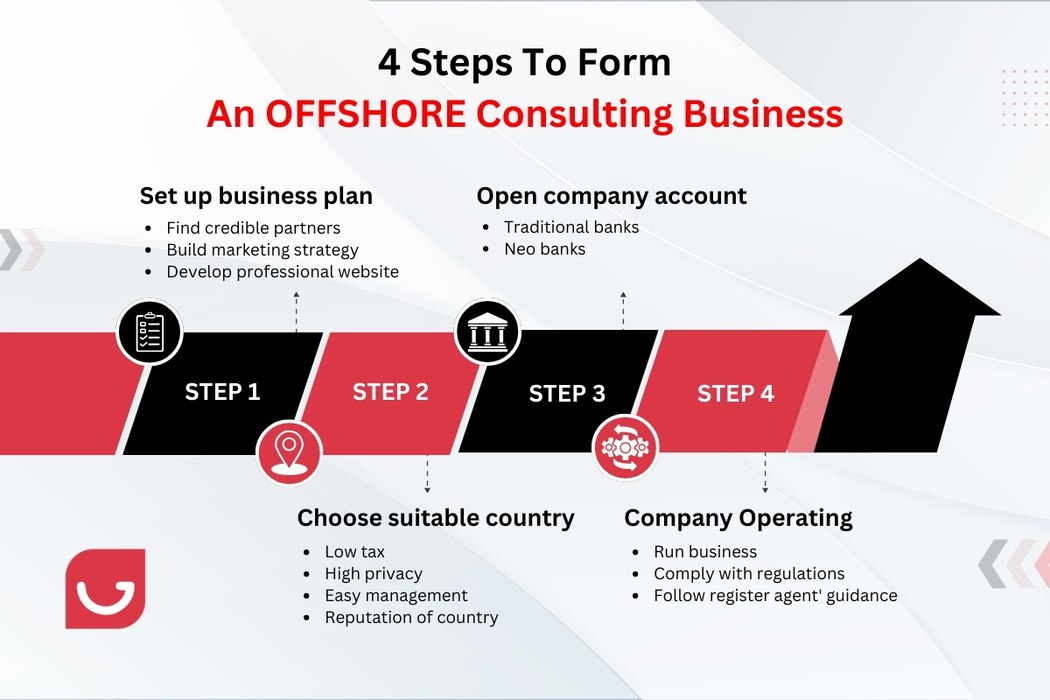Demystifying Offshore Firm Formations: How They Operate and What to Anticipate
Offshore business formations can seem complex and enigmatic. Offshore Company Formations. These entities, typically established for tax benefits and personal privacy, operate under unique lawful structures. Business owners may find themselves maneuvering through a labyrinth of guidelines and compliance requirements. Understanding the intricacies is crucial for success. What are the real advantages? What are the prospective challenges? A closer assessment reveals the nuances that might impact decision-making substantially
Recognizing Offshore Companies: Kinds and interpretations
Offshore business are entities developed in a jurisdiction beyond an individual's or organization's main nation of residence, typically for functions connected to tax obligation optimization, asset security, or regulatory benefits. These companies can take different forms, consisting of restricted liability firms (LLCs), international service companies (IBCs), and offshore trust funds. Each type offers specific functions and attract various requirements.
Minimal obligation business offer owners with protection from personal liability, while global organization firms are prominent for their flexibility and minimal reporting needs. Offshore trust funds, on the various other hand, are used mainly for estate planning and asset security.
The option of jurisdiction substantially influences the company's procedures, as some locations provide a lot more desirable legal frameworks and personal privacy defenses. Offshore Company Formations. Understanding the distinctions between these types is important for people and companies thinking about overseas structures, as each choice carries different effects for governance and compliance
The Advantages of Developing an Offshore Business
Developing an offshore business can supply many benefits, especially for those looking for to improve their monetary methods and secure their properties. One substantial advantage is tax obligation optimization; several territories offer beneficial tax prices or exceptions, enabling businesses to keep even more profits. In addition, offshore firms can provide a layer of privacy, securing the identities of owners and investors from public analysis.
One more benefit is possession protection. By positioning properties in an offshore entity, people can protect their wealth from prospective lawful cases or political instability in their home nations. This structure likewise promotes international company procedures, making it possible for simpler access to worldwide markets and diverse customers.
The establishment of an offshore company can boost reputation and reputation, appealing to customers that value international business methods. Generally, these benefits make offshore business formations an attractive alternative for people and organizations going for financial development and protection.
Secret Factors To Consider Before Forming an Offshore Entity
Before developing an overseas entity, several critical elements have to be evaluated. Lawful compliance demands, tax effects and advantages, along with territory choice, play a considerable role in the decision-making procedure. Recognizing these considerations can help people and businesses browse the complexities of overseas firm formations successfully.

Lawful Compliance Requirements
When considering the formation of an offshore entity, understanding legal compliance needs is vital to guarantee adherence to both worldwide and regional legislations. Prospective service owners should familiarize themselves with policies governing company registration, reporting responsibilities, and operational criteria in the picked territory. This includes verifying the legal requirements for investors and directors, as well as guaranteeing conformity with anti-money laundering (AML) and know-your-customer (KYC) regulations. In addition, organizations need to continue to be mindful of any type of licensing requirements certain to their market. Involving local lawful and economists can offer important understandings, making sure that all essential documentation is prepared and submitted correctly. Ultimately, extensive understanding of lawful conformity aids mitigate risks and promotes a lasting overseas operation.
Tax Effects and Advantages
Countless company owner take into consideration the tax implications and advantages of developing an offshore entity as a critical factor in their decision-making process. Offshore business can offer substantial tax obligation benefits, such as minimized business tax prices, exception from certain neighborhood taxes, and the ability to defer tax obligations on international earnings. These advantages can cause boosted productivity and cash money circulation, making offshore frameworks appealing for global business procedures. Furthermore, the capacity for tax treaties may even more lessen tax liabilities. It is important for organization owners to comprehend the intricacies entailed, including conformity with both regional and worldwide tax guidelines. Involving with tax obligation professionals is suggested to navigate these complexities successfully and guarantee perfect tax obligation planning approaches.
Jurisdiction Option Elements
What factors should one think about when choosing a jurisdiction for overseas company development? Secret factors to consider include tax efficiency, governing environment, and political security. Territories with beneficial tax obligation regimens can substantially impact productivity. The regulative landscape must offer versatility and simplicity of conformity, enabling reliable service operations. Political security is important, as it ensures the safety and security of possessions and connection of procedures. Additionally, the track record of the jurisdiction can influence client depend on and organization connections. Ease of access to financial solutions and the schedule of professional support services are likewise essential. Comprehending regional regulations pertaining to privacy, coverage, and possession demands is essential to identify that the offshore entity straightens with the company owner's goals and lawful responsibilities.
The Process of Establishing an Offshore Firm
Establishing an overseas business involves a this post collection of tactical actions that need careful preparation and compliance with global guidelines. At first, a private should pick an appropriate jurisdiction that straightens with their company purposes and provides favorable tax benefits. Adhering to territory choice, the next step is to select a distinct firm name and prepare the required paperwork, consisting of articles of consolidation and shareholder contracts.
Once the paperwork prepares, it has to be sent to the pertinent authorities together with the required costs. After approval, the firm will obtain a certification of incorporation, formally developing its legal existence. The specific should then open a company checking account to help with financial transactions.
Maintaining an overseas business includes adhering to ongoing compliance requirements, such as annual coverage and tax obligations, which differ by territory. For that reason, comprehending each step is important for a successful overseas business development.
Legal and Governing Framework for Offshore Firms
While developing an offshore company can supply considerable benefits, it is vital to navigate through the complex lawful and governing framework that governs such entities. Each jurisdiction has its own collection of laws that determine every little thing from company development to taxation and conformity needs. These regulations are created to stop prohibited activities, such as cash laundering and tax obligation evasion, and often need detailed documents and transparency.
Crucial element of this structure include the need of appointing regional supervisors, maintaining a registered office, and sticking to yearly reporting commitments. Additionally, numerous territories enforce specific licensing requirements for sure business tasks. Comprehending these legal specifications is essential for making sure compliance and mitigating risks connected with penalties or legal disagreements. Involving with legal experts that specialize in overseas firms can aid in navigating with this elaborate landscape, eventually assisting in a compliant and effective offshore company operation.
Typical False Impressions Concerning Offshore Companies
Many individuals hold mistaken beliefs regarding overseas companies, often equating them with tax evasion and unlawful tasks. Nonetheless, it is very important to identify that these entities can run legally within a framework designed for genuine business practices. Clearing up the lawful condition of overseas firms can help eliminate these misconceptions and promote an extra accurate understanding of their objective.
Tax Obligation Evasion Misconceptions
Regardless of the expanding popularity of overseas companies, false impressions about their use for tax obligation evasion continue. Numerous individuals incorrectly believe that establishing an overseas entity is only a method to stay clear of tax obligations. However, offshore firms are typically used for genuine purposes, such as possession protection, worldwide service expansion, and investment diversity. The perception that all overseas activities relate to illicit tax obligation evasion neglects the intricacies of global tax policies and conformity requirements. Additionally, the substantial majority of offshore jurisdictions have carried out procedures to combat tax obligation evasion, promoting transparency and info exchange. This mischaracterization can hinder genuine organizations and capitalists from discovering the prospective advantages of offshore business formations while bolstering a negative stigma bordering these entities.
Legal Standing Clarified
The legal standing of offshore business is usually misinterpreted, bring about a variety of misconceptions. Lots of think these entities run in a legal grey location, presuming they are naturally prohibited or underhanded. In truth, offshore firms are legitimate organizations formed under the legislations of certain territories, created for numerous factors, consisting of possession defense and market development. An additional usual mistaken belief is that overseas business evade taxes completely; however, they undergo the laws and tax obligation responsibilities of their home countries. In addition, some individuals assume that overseas companies can be conveniently manipulated for money laundering or illegal tasks. While abuse can happen, many territories apply stringent conformity and openness laws to mitigate such risks, making certain that offshore companies operate within legal structures.

Taking care of and Operating Your Offshore Business Efficiently
Successfully taking care of and operating an overseas company calls for a tactical technique that stabilizes conformity with regional guidelines and the search of service objectives. Effective overseas monitoring entails comprehending the territory's tax obligation legislations, reporting requirements, and functional laws. Utilizing local professionals, such as accounting professionals and lawful experts, can give important insights into traversing these complexities.
Furthermore, establishing clear communication channels and functional protocols is vital for maintaining efficiency. Utilizing modern technology for task monitoring and collaboration can improve efficiency, while my company routine performance reviews guarantee placement with critical goals.
In addition, maintaining robust financial records is necessary, as openness fosters count on with stakeholders and follow global criteria. Being versatile to adjustments in legislation or market problems allows overseas firms to pivot efficiently, assuring long-term sustainability and development. By adhering to these concepts, company see proprietors can maximize the advantages of their overseas ventures while mitigating dangers.
Regularly Asked Inquiries
Just how much Does It Expense to Preserve an Offshore Firm Yearly?
The expense to maintain an offshore company each year varies significantly, generally ranging from $1,000 to $5,000, relying on jurisdiction, services needed, and compliance commitments. It is vital to consider added fees for particular needs.
Can I Open Up a Savings Account for My Offshore Business From Another Location?
Opening up a savings account for an overseas company from another location is generally possible. Requirements may differ by territory, typically necessitating documentation and verification processes, which can complicate the remote application experience for individuals.
Are There Particular Nations Recognized for Easier Offshore Firm Formations?
Specific nations, such as Belize, Seychelles, and the British Virgin Islands, are renowned for their structured processes and beneficial regulations concerning overseas company formations, attracting entrepreneurs seeking performance and discretion in organization operations.
What Kinds of Companies Are Best Matched for Offshore Business?
Certain organizations, such as ecommerce, consultancy, and financial investment firms, often profit from offshore firms due to tax obligation advantages, personal privacy, and regulatory versatility - Offshore Company Formations. These entities typically prosper in territories that advertise positive business atmospheres
Just How Can I Guarantee Conformity With Local Legislations When Running Offshore?
To guarantee compliance with regional regulations when operating offshore, it is important to involve legal professionals, perform comprehensive research study on territory regulations, and keep transparent financial records, therefore minimizing risks related to non-compliance.
